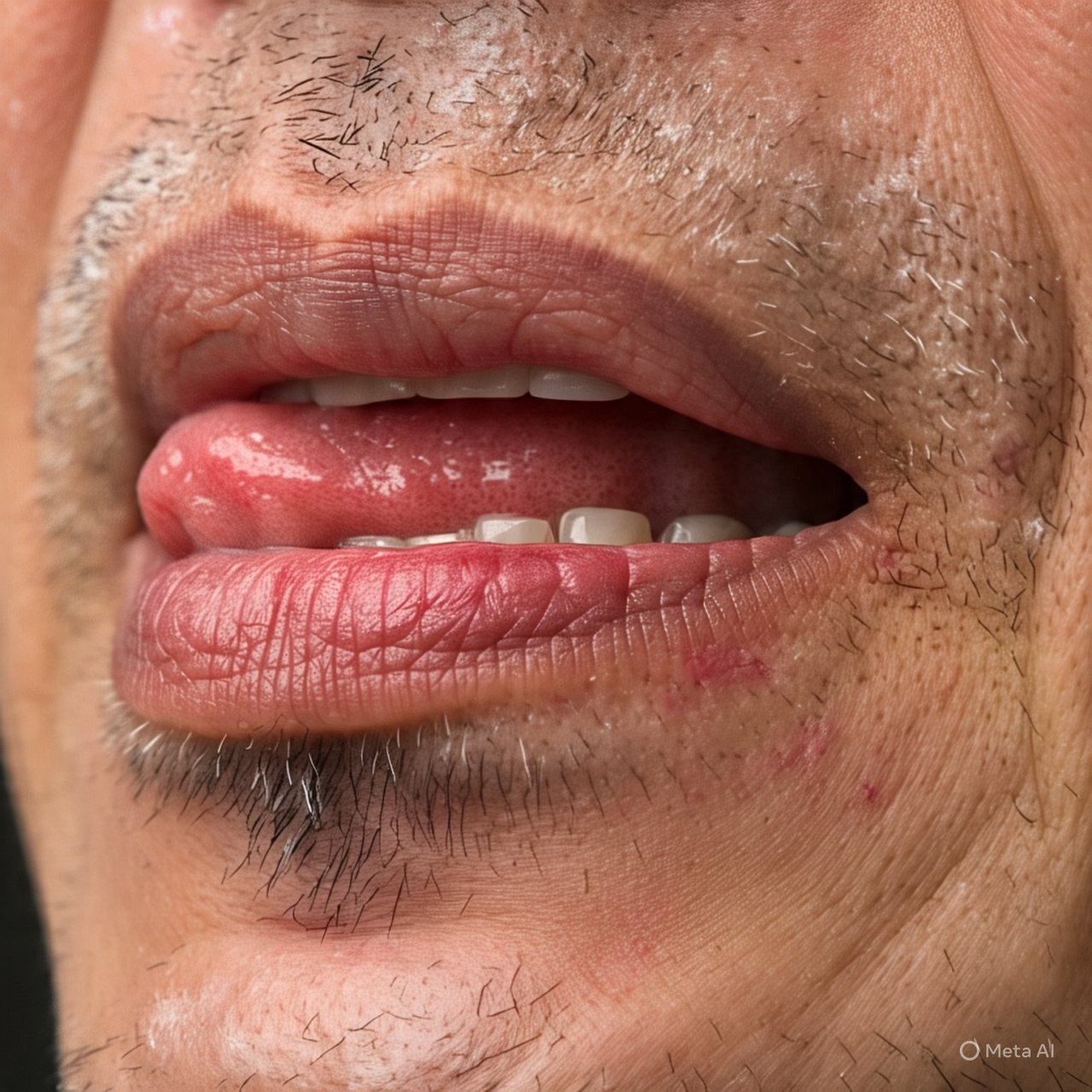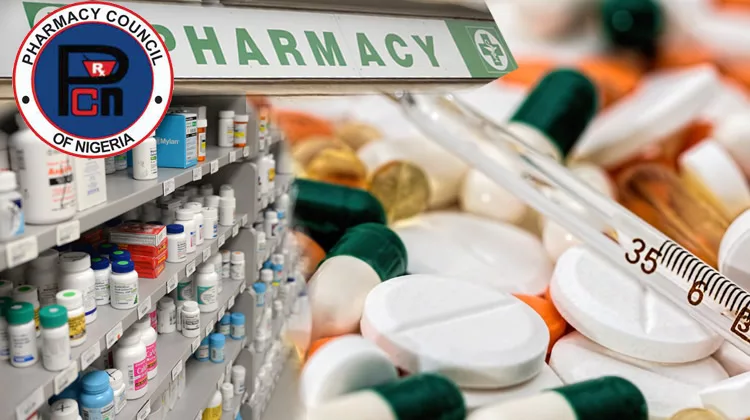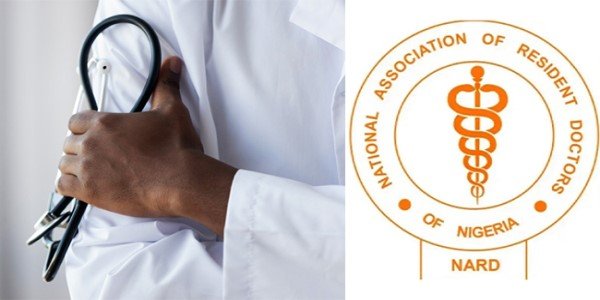Chronic mouth inflammation—often dismissed as minor ulcers, persistent soreness, or gum irritation—can quietly fuel a surge in oral cancer cases across Nigeria if adequate measures are not taken. In this report, Korede Abdullah, Africa Health Report Southwest correspondent, exposes what triggers the silent crisis.
A Hidden Danger in the Mouth
It begins quietly — a bleeding gum here, a persistent sore there — and is often brushed aside as nothing serious. But beneath the surface, this silent spark of mouth inflammation could be lighting the fuse for one of the most devastating yet preventable cancers in Nigeria today: oral cancer.

The rising cases of oral cancer, driven by chronic inflammation from gum diseases, poor diets, and harmful habits, are becoming an underreported public health crisis that demands urgent attention. As Professor Victor Ifeolu Akinmoladun of the University of Ibadan puts it while delivering the 582nd inaugural lecture of the university titled: The Scalpel and the Laboratory: Collaboration Against the Lawless, “Many cancers are known to be induced by chronic inflammation, while many more are sustained by it.”
Widespread Mouth Inflammation and Public Ignorance
Africa Health Report (AHR) findings show that the heart of the problem is mouth inflammation — an umbrella term for conditions like gingivitis and periodontitis that are alarmingly common in Nigeria. These conditions often present with swollen, bleeding gums, persistent bad breath, and gum tenderness.
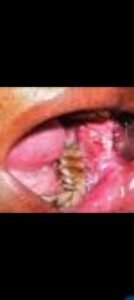
“Unfortunately, many Nigerians see these signs as normal, or as something that will go away on its own,” said Dr. Esther Onwudiwe, a Lagos-based dentist.
The World Health Organization (WHO) has highlighted poor oral hygiene as a significant contributor to the global burden of oral diseases, particularly in low-income countries like Nigeria.
The Inflammation-Cancer Connection Explained
Scientists have long recognized the dangerous link between chronic inflammation and cancer, and oral cancer is no exception. Persistent gum disease fuels the release of inflammatory chemicals — cytokines, prostaglandins, and growth factors — that can trigger DNA mutations in oral tissues.
“This is where the inflammation-cancer connection becomes deadly,” explained Professor Akinmoladun. Studies in Nigeria and globally show that people with long-standing gum disease are at significantly higher risk of developing oral squamous cell carcinoma (OSCC).

Everyday Habits That Worsen the Risk
Everyday habits continue to pour fuel on this fire. Smoking, chewing tobacco, and the growing use of betel nut among some communities are well-established culprits. These substances introduce harmful chemicals that directly damage the lining of the mouth, creating fertile ground for cancerous changes over time.
Excessive consumption of alcohol and pro-inflammatory diets — loaded with sugary drinks, processed meats, and fried foods — create a toxic environment that weakens the mouth’s natural defenses. Regular intake of these foods not only promotes chronic gum inflammation but also alters the balance of healthy bacteria in the mouth, making it easier for harmful pathogens to thrive.
“What we eat is as important as what we brush with,” noted Dr. Abdulrahman Yusuf, a public health nutritionist. These habits sustain inflammation and accelerate the pathway to cancer. He added, “Many people underestimate the danger of consistently poor dietary choices, not realizing that the mouth often mirrors the body’s overall health status.”
Experts also point to poor oral hygiene — such as irregular brushing and failure to visit the dentist — as a silent accomplice in this dangerous equation. When combined with these harmful lifestyle choices, the risk multiplies, turning everyday neglect into a major public health concern.
Missed Early Signs and Lost Time
The warning signs of early oral cancer are often subtle but deadly when ignored. Persistent mouth ulcers, unexplained pain, white or red patches on the gums or tongue, and difficulty in chewing or swallowing should not be taken lightly.
Experts add that unusual bleeding, numbness in the mouth, or a persistent sore throat are also red flags that should prompt immediate medical attention.
“Oral cancer is one of those conditions where early detection can save a life, but the window for early detection is small,” said Dr. Ibrahim Abdullah, a consultant oncologist.
Yet, many Nigerians only seek help when these signs have persisted for months or even years, allowing the disease to advance unchecked. This delay is often worsened by limited access to dental care, high treatment costs, and cultural beliefs that favor traditional remedies over hospital visits.
Health advocates warn that this lost time can mean the difference between a simple surgical removal of a lesion and the need for aggressive treatments like chemotherapy, radiotherapy, or disfiguring surgeries that drastically reduce quality of life. They stress the need for public education campaigns to raise awareness about these early symptoms and encourage routine oral health check-ups.
High-Risk Groups and the Data Gap
Certain populations are at greater risk. Middle-aged and older adults, people with long-term gum disease, smokers, heavy drinkers, and those in rural or low-income communities with little access to dental care form the bulk of cases.
Professor Akinmoladun lamented, “Figures on the burden of the disease are difficult to obtain in Nigeria, and data on survival in oral cancer is also hardly available — and that’s part of the problem.” Without reliable data, designing effective interventions remains a major challenge.
Barriers to Early Detection and Dental Care
Regular dental visits are a critical line of defense, but cost, fear of pain, and cultural misconceptions keep many away. “There is a widespread belief that going to the dentist is only for when you have a toothache,” observed Dr. Yusuf.
This mindset leaves early signs unnoticed and untreated. Moreover, in a country where basic healthcare is often unaffordable, dental care is seen as a luxury few can afford.
The shortage of dental clinics, particularly in rural areas, further compounds the problem. Many Nigerians live miles away from the nearest qualified dentist, making routine checks impractical.
“Accessibility is a major issue. In some communities, there isn’t a single dental facility within a reasonable distance,” said Dr. Funke Olanrewaju, a public health advocate.
Additionally, a lack of awareness about the link between oral health and serious conditions like cancer means people delay seeking care until symptoms are severe. Campaigns to promote preventive dental care are sporadic and underfunded.
Experts argue that a national oral health policy with subsidized dental services and regular screenings is long overdue to reverse these trends.
The Harsh Cost of Late-Stage Diagnosis
The cost of late detection is devastating. Advanced oral cancer requires aggressive treatments — surgeries, chemotherapy, radiotherapy — that are not only expensive but also take a tremendous physical and emotional toll on patients and families.
“By the time most cases present at tertiary centers, the cancer has spread, and survival chances are slim,” said Dr. Onwudiwe. Late-stage treatment often results in lifelong disability, disfigurement, or death.
Myths, Misconceptions, and Dangerous Delays
Adding to the challenge are dangerous myths and misconceptions that downplay the risks. “People say, ‘It’s just bleeding gums’ or ‘Only smokers get oral cancer,” Professor Akinmoladun noted.
Others trust traditional remedies to heal persistent sores, delaying medical treatment. Experts warn that these beliefs perpetuate dangerous delays in diagnosis and care. Dr. Yusuf urged, “We need strong health education campaigns to dispel these myths and encourage early medical consultation.”
Towards a United Front in Prevention
Ultimately, the fight against oral cancer in Nigeria must involve both dentists and primary healthcare workers. Routine screening, early referrals, and community-level awareness are crucial.
Experts call for stronger collaboration between dental services and general healthcare, more investment in oral health infrastructure, and inclusion of oral cancer checks in primary health programs. As Akinmoladun concluded, “It’s a battle we can win — but only if we act early, and act together.”
The Role of Schools and Workplaces in Prevention
Health experts are now advocating for schools and workplaces to become active hubs for oral cancer prevention. By integrating oral health education into school curricula and workplace wellness programs, communities can catch harmful habits early and encourage healthier lifestyles.
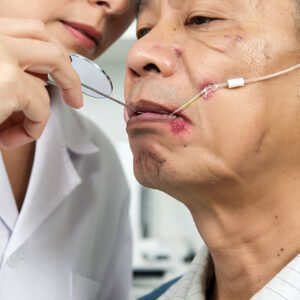
“We need to start teaching children about the importance of oral hygiene before bad habits form,” said Dr. Charles Adeyemo. Employers, too, can play a vital role by offering regular dental screenings and promoting smoke-free environments. Such grassroots efforts could shift public perception and build a culture of prevention that extends beyond hospitals.
Policy and Funding: The Missing Links
Despite the growing threat, oral cancer receives little attention in Nigeria’s health policies and budgets. Experts argue that without dedicated funding for oral cancer awareness, screening, and treatment, efforts will remain fragmented.
“We need national guidelines on oral cancer screening, and funding to train health workers at all levels,” stressed Dr. Adeyemo.
Stakeholders are also calling for subsidies on dental care, inclusion of basic dental services in the National Health Insurance Scheme, and greater investment in research to generate reliable data. Without these policy shifts, the silent spark of oral inflammation may continue to ignite tragedies in Nigerian families.

